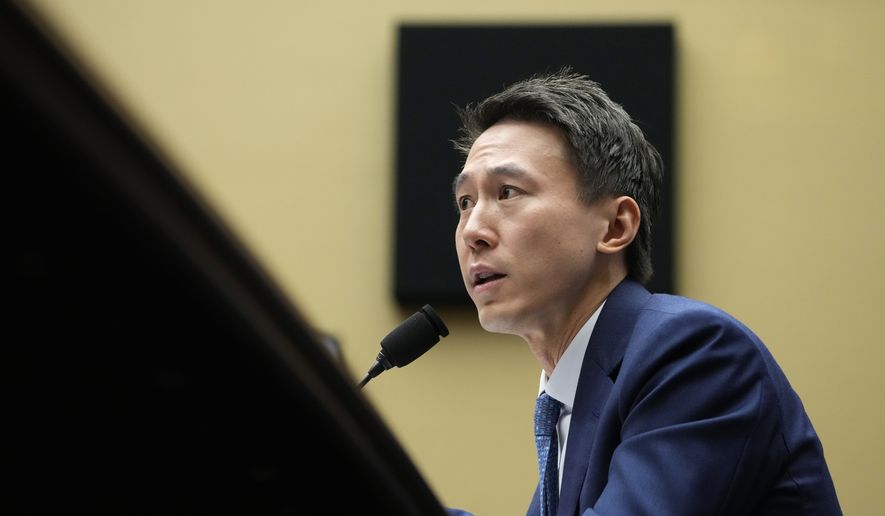TikTok CEO Shou Zi Chew’s defense against allegations that Americans’ data is vulnerable to the Chinese Communist Party faced deep bipartisan skepticism at a House hearing Thursday, as fears over the app’s security risk mount.
Congressional proposals empowering the federal government to ban TikTok in the U.S. are gaining momentum. Mr. Chew testified before the House Energy and Commerce Committee to try to persuade policymakers to go in another direction.
Mr. Chew told lawmakers he knew of no cases when the Chinese government ever accessed data on the wildly popular video-sharing app, that his company was headquartered in California, not China, and that TikTok was more transparent than comparable U.S. social media companies.
But many members of the Energy and Commerce Committee appeared unpersuaded, including Rep. Cathy McMorris Rodgers, the committee’s chairwoman. The Washington Republican favors banning the app in America, and she challenged Mr. Chew’s assertions.
“TikTok has repeatedly chosen the path for more control, more surveillance and more manipulation,” Mrs. Rodgers said at the hearing. “Your platform should be banned. I expect today you’ll say anything to avoid this outcome.”
Mrs. Rodgers said Congress needs to ensure that no tech platform ever spies on Americans again.
Mr. Chew disputed that his app snoops on Americans. “Chair Rodgers, I, first of all, disagree with the characterization that is spying,” he said.
China’s policy of civil-military fusion compels businesses to work with the country’s communist regime, and TikTok has a China-founded parent company, ByteDance.
Rep. Anna Eshoo, California Democrat, said the Chinese government has access to TikTok’s data and sparred with Mr. Chew about who may obtain the app’s information.
“Congresswoman, I have seen no evidence that the Chinese government has access to that data, they have never asked us, we have not provided,” Mr. Chew said at the hearing.
“I find that actually preposterous,” Ms. Eshoo interjected.
Mr. Chew said his team is in the process of migrating data sitting in its servers in Virginia and Singapore and would be subject to only America’s laws and not foreign rules when the process is complete.
“This eliminates the concern that some of you have shared with me that TikTok user data can be subject to Chinese law,” Mr. Chew said. “This goes further, by the way, than what any other company in our industry has done.”
Mr. Chew also acknowledged that the China-founded app had gathered precise location information on Americans a few years ago, contrary to its public denials at the time. But he said the recent versions of the TikTok app not do so any more.
“Are there currently TikTok users who still hold old versions of the app that collect precise GPS information from U.S. users?” Rep. Debbie Dingell asked. “Yes or no?”
“There could be, but that’s a small percentage,” Mr. Chew told the Michigan Democrat.
Lawmakers were hardly placated. Rep. Frank Pallone, New Jersey Democrat, said he did not believe TikTok’s plan to wall off American data from China’s prying eyes would work.
“I still believe that the Beijing communist government will still control and have the ability to influence what you do,” the committee’s top-ranking Democrat told Mr. Chew at the hearing.
Rather than persuade lawmakers to support his side, Mr. Chew’s testimony may have pushed Democrats and Republicans closer together, according to Rep. Tony Cardenas, California Democrat.
“It might sound a little funny but you have, in fact, been one of the few people to unite this committee,” Mr. Cardenas said to Mr. Chew. “Members, Republicans and Democrats, to be in agreement that we’re frustrated with TikTok, we’re upset with TikTok.”
Republican lawmakers agreed. After questioning Mr. Chew about TikTok content appearing to threaten federal lawmakers, Rep. Randy Weber of Texas suggested TikTok’s days are numbered.
“My time is up and if this committee gets its way, TikTok’s time is up,” Mr. Weber said.
The Biden administration has maintained a national security review of TikTok and has reportedly pressured its China-founded parent company to sell off its interest in TikTok. But Beijing appears to think it will have the final say, announcing Thursday it would strongly oppose any forced sale of TikTok, according to The Wall Street Journal.
• Ryan Lovelace can be reached at rlovelace@washingtontimes.com.




Please read our comment policy before commenting.